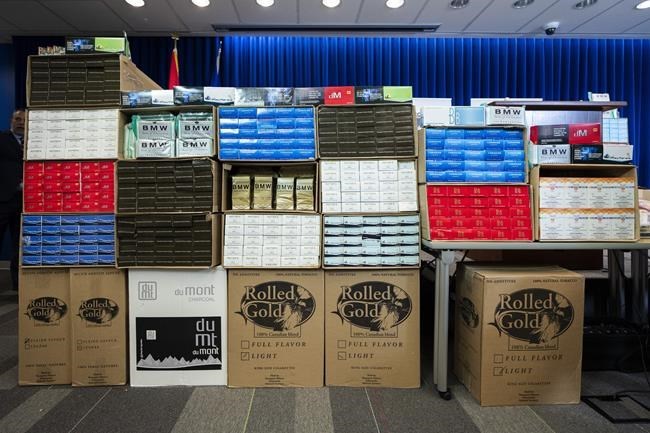SURREY, B.C. — Police in British Columbia say they've seized more than 27 tonnes of contraband cigarettes worth more than $24 million in a pair of investigations over the past year.
Assistant RCMP Commissioner David Teboul said Friday at a news conference that their work involved collaboration with tax fraud investigators from the B.C. Ministry of Finance.
He said the seizures of 133,000 cartons of cigarettes is a "major blow to numerous organized crime groups."
"They are the main orchestrators and beneficiaries of contraband tobacco sales, which are highly lucrative," Teboul said.
Public Safety Minister Mike Farnworth said the most recent raids in Mission, B.C., and Maple Ridge on Feb. 28, involving 67,500 cartons, represented the largest one-time seizure of contraband cigarettes in the province.
Farnworth, who also attended the news conference, said the seizure was not only a blow to gangs and organized crime groups, but also a welcome development for small retailers including corner stores that depend on legal tobacco sales.
"Taking this off the streets also helps those small businesses that are working hard to provide for their families," he said.
Investigators served four search warrants last week in Maple Ridge and Mission where the cigarettes were stored, making two arrests and seizing more than 30 kilograms of silver and $100,000 in cash.
Cpl. Arash Seyed, spokesman for the RCMP's federal serious organized crime unit, said the latest seizure has "dismantled numerous criminal operations."
"Many transnational organized crime groups that are involved in the trafficking of illicit drugs, precursor chemicals and weapons are also involved in the trafficking of contraband tobacco through the use of their existing drug pipelines," Seyed said at the news conference.
He said the latest investigation began last fall, leading police to suspected storage and distribution facilities for the illegal cigarettes.
A separate probe into contraband cigarettes, Seyed said, began in the fall of 2021 in Nanaimo, B.C., and later widened to include Vancouver, Edmonton, Langley, Abbotsford and the village of Cobble Hill on Vancouver Island.
That led to seizures last spring and summer, netting 66,000 cartons of contraband cigarettes and 10 arrests.
Seyed said in an interview Friday that charges against a dozen people arrested in the two investigations are still in the charge approval process, which can take months.
He said the seized cigarettes are almost all believed to have been manufactured in Quebec on First Nations territory near the U.S. border.
"The illicit tobacco trade poses a serious domestic and international threat, as it funds the growth and expansion of transnational organized crime, in addition to undermining public health objectives," Seyed said.
He said those arrested "may face criminal charges," as well as civil forfeiture proceedings and "other legal remedies."
Sara McIntyre, spokeswoman for the Convenience Industry Council of Canada, said small retailers can't compete fairly with the illicit market.
She said there's been a "massive proliferation" as tax hikes have pushed the price of cigarettes up beyond $15 a pack, while online sales of contraband cigarettes have also eaten into sales at brick-and-mortar stores.
Members, she said, have reported declining sales and lower foot traffic of between 15 and 40 per cent, but she said consumers shouldn't necessarily take the blame.
She said enforcement efforts should continue, and penalties need to go beyond "slaps on the wrist."
"From our industry's perspective, it should be focused in on who's manufacturing it, who's shipping it, and who's profiting from it," she said.
— By Darryl Greer in Vancouver
This report by The Canadian Press was first published March 8, 2024.
The Canadian Press



